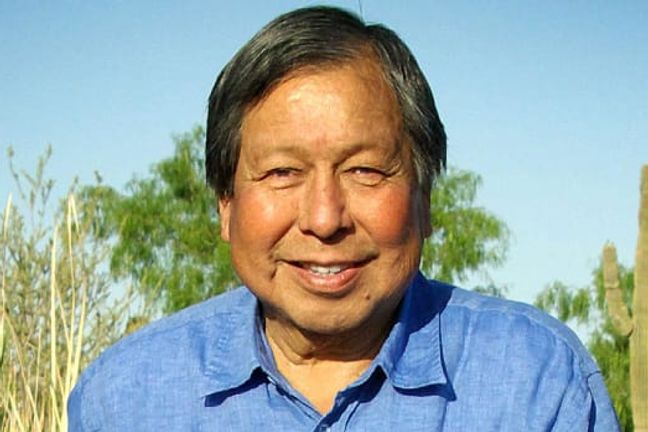
Rodney Lewis was the first member of an Arizona Indigenous tribe to be admitted to the State Bar of Arizona and to win a case before the Arizona Supreme Court.
A member of the Pima Tribe, Lewis was known for his devotion to bettering the lives of Native Americans and their communities. He worked to support and protect the Gila River Indian Community, a reservation home to 14,000 members from the Akimel O’otham (Pima) and the Pee-Posh (Maricopa) Tribes.[i]
Lewis earned his B.S. from Trinity University in San Antonio, Texas. He later joined the U.S Army Infantry and received an honorable discharge after rising to the rank of First Lieutenant and becoming both Airborne- and Ranger-qualified. He earned his M.A. in History from Arizona State University and his J.D. from the University of California, Los Angeles. Lewis was the first Native American admitted to the Arizona State Bar, and he served as the founding chair of the Arizona Bar’s Indian Law sector.
Lewis’ law practice focused on Indian law, tribal gaming compacts, water and energy law, and public policy matters. He served as General Counsel for the Gila River Indian Community for more than three decades. During his esteemed 40-year career, many sought out Lewis for his exceptional legal services.
Shortly after he was barred in Arizona, Lewis took on Central Machinery Company vs. Arizona State Tax Commission, a case involving tribal sovereignty. Lewis opposed the State’s attempted taxation of tractors sold to the Gila River Indian Community’s farming division. His work on the case resulted in a 5-4 victory against taxation. The win made him the first Native American attorney to successfully argue a case before the Arizona Supreme Court.[ii]
Lewis viewed water as vital for growth and development for Native American communities. In the 1800s, the building of dams and other construction cut off the reservation’s access to the Gila River. Without the River’s life-giving water, farming in the Gila River Indian Community was decimated. Lewis worked tirelessly on the Gila River water rights settlement—a landmark agreement he saw fulfilled in Title II of the Arizona Water Settlement Act of 2004. The agreement resolved water rights claims and in addition, provided the Gila River Indian Community with a water budget.[iii]
Lewis was nationally recognized for his work both in tribal law and for water rights. Over the course of his career, he paved the way for other Native Americans in the law, and his work has had an indelible impact for future generations. Following his death in 2018, the State Bar Indian Law Section established the Rodney B. Lewis Award of Excellence in his honor, which recognizes “an Arizona Bar member who exemplifies the honesty, integrity, courage, grace, dignity, and respect of its namesake.”
[i] http:/www.gilariver.org/index.php/about
[ii] https://www.law.cornell.edu/supremecourt/text/448/160
[iii] https://www.usbr.gov/lc/phoenix/AZ100/2000/az_water_settlement_2004.html

 Cannabis Workers Allege Quota to Trim 4 Pounds a Day Violates the California Labor Code
Cannabis Workers Allege Quota to Trim 4 Pounds a Day Violates the California Labor Code
 The Ninth Circuit Reminds Us: Every Word Matters
The Ninth Circuit Reminds Us: Every Word Matters
 NO WAY, PRO SE! The Consequences of Abusing the Judicial System as a Pro Se Litigant in Colorado
NO WAY, PRO SE! The Consequences of Abusing the Judicial System as a Pro Se Litigant in Colorado
 Victim of Financial Mismanagement or Unlawful Retaliation? New Jersey City University Program Founder Claims School Retaliated After Reporting Alleged Sexual Harassment
Victim of Financial Mismanagement or Unlawful Retaliation? New Jersey City University Program Founder Claims School Retaliated After Reporting Alleged Sexual Harassment
 “Real Housewives” Gets a Reality Check
“Real Housewives” Gets a Reality Check
 Missing a Chapter: Insufficiency of Expert Deposition Testimony in Medical Malpractice Litigation
Missing a Chapter: Insufficiency of Expert Deposition Testimony in Medical Malpractice Litigation
 Crash Course: Why Summary Judgment Misses the Mark in Illinois Multi-Cause Limousine Crash Collision
Crash Course: Why Summary Judgment Misses the Mark in Illinois Multi-Cause Limousine Crash Collision
 Bitter Truths: Lead, Cadmium, and Defective Pleadings in California Chocolate Class Action
Bitter Truths: Lead, Cadmium, and Defective Pleadings in California Chocolate Class Action
 The Law of Unintended Consequences: Including Insurance Brokers in Litigation Strategy Communication May Waive the Attorney-Client Privilege
The Law of Unintended Consequences: Including Insurance Brokers in Litigation Strategy Communication May Waive the Attorney-Client Privilege